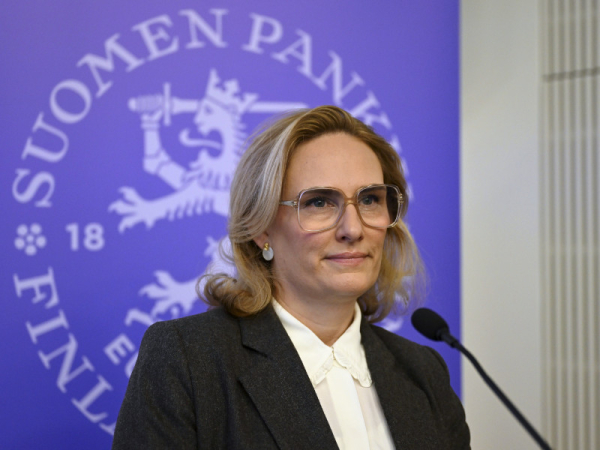
Meri Obstbaum, the head of forecasting at the Bank of Finland, talked about the central bank’s expectations for the national economy at a news conference in Helsinki on Tuesday, 19 December 2023. Obstbaum said the recession will have an impact particularly on industry and residential construction, adding that both sectors have an outsized influence in Finland. (Markku Ulander – Lehtikuva)
- Next Article Finland’s recession to be deeper and longer than expected, says top official
THE ECONOMIC OUTLOOK for Finland has deteriorated materially in the latter half of this year.
The Bank of Finland on Tuesday downgraded its economic forecast for this and next year, drawing attention to weaker-than-expected economic growth in the final stretch of this year and the near complete lack of indicators providing hope for a quick turnaround.
The Finnish economy, it said, is set to contract by 0.5 per cent in 2023 and by 0.2 per cent in 2024. The figures represent downgrades of 0.3 and 0.4 percentage points, respectively, from the forecast published in September.
Meri Obstbaum, the head of economic forecasting at the Bank of Finland, said the forecast is a reflection of slowing economic growth in the eurozone and Sweden. The recession is expected to hit especially industry and residential construction, both segments with an outsized influence in Finland.
“That’s why the recession will drag on and the economy will recover slowly,” she stated at a news conference.
Obstbaum said the economic fragility is also attributable to a new structural problem.
“We’ve earlier received reasonably affordable energy and other raw materials from Russia. We’ve lost this competitive edge due to the war of aggression Russia launched in Ukraine. Also the production of goods with high added value has decreased for a long time in Finland. The problems in the economy aren’t caused exclusively by the cyclical situation.”
The economic fragility is broad-based.
Household consumption is being held back by higher-than-usual interest rates, rising consumer prices and general uncertainty about the economy. Recovery from the recession is also hampered by a substantial decline in investments, particularly in the area of residential construction.
Despite the dark outlook, rapidly slowing inflation is expected to beef up the purchasing power of consumers. The Bank of Finland forecasts that harmonised inflation will come in at 1.0 per cent in 2024, 1.4 per cent in 2025 and 1.7 per cent in 2026.
“The strengthening of purchasing power will boost household consumption, and the economy will start its slow recovery. Consumption is also being driven by the fact that wages are rising and the employment situation will remain fairly good,” noted Obstbaum.
The Bank of Finland revealed that it expects the unemployment rate to rise to 7.2 per cent in 2023 and to 7.8 per cent in 2024, before dropping to 7.5 per cent in 2025.
The recovery is expected to start at the end of next year.
The central bank also expressed its concern about the growing debt burden of central government, viewing that the deficit in public finances will widen and the debt burden will grow in the coming years despite policy efforts to address the situation. Its forecast indicates that central government debt will rise from 75 per cent of GDP in 2023 to 81 per cent of GDP in 2026, marking the first time the debt ratio has breached the 80-per-cent mark.
The budgetary position will be undermined in the coming years by slowing growth in tax revenue, cuts in social security contributions and marked growth in social security payments, public demand and interest rate costs.
The Bank of Finland has raised its estimate of the sustainability deficit – a measure of the scale of spending cuts or tax increases required to balance central government revenue and expenditure – to roughly 4.5 per cent.
“Balancing public finances will require concrete measures affecting both revenue and expenditure, as well as structural reforms that support economic growth,” outlined Marja Nykänen, a deputy board chairperson at the Bank of Finland.
Finland, she viewed, has all the prerequisites to succeed as long as economic policy makers place priority on debt sustainability and commit to the approach for several electoral terms.
It is simultaneously necessary to safeguard investments in high-quality education in order to promote innovation and the utilisation of innovations from other parts of the world, added Nykänen. Skilled labour is a precondition not only for innovations that create investments in new technologies, but also for the broad-based adoption of new ideas and practices.
Aleksi Teivainen – HT
- Next Article Finland’s recession to be deeper and longer than expected, says top official
Source: www.helsinkitimes.fi
